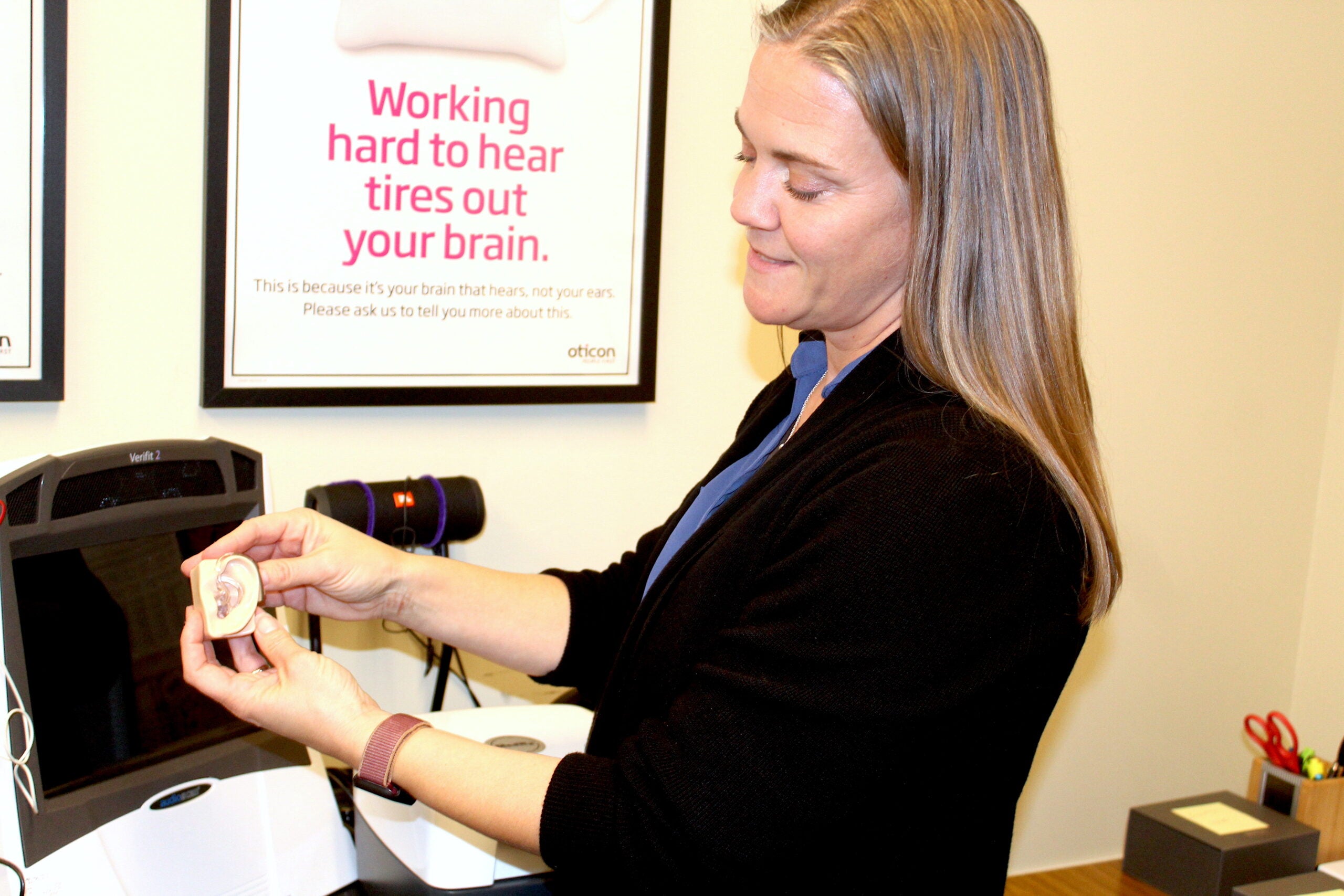KINGSTON, R.I. — Nov. 27, 2023 — The University of Rhode Island Speech and Hearing Centers are helping give the “gift of hearing” to members of the community not just during this holiday season, but all year long.
The centers, part of the College of Health Sciences, have partnered with the Ocean State Center for Independent Living to provide hearing aids and associated services to those who otherwise wouldn’t be able to afford the costly devices that medical insurance does not always cover. Those in need of hearing services can apply for the “Gift of Hearing” through an OSCIL grant for either no-cost or reduced-cost hearing aid service.
“Anybody who qualifies then comes to us to receive the aids and hearing aid services,” said Rachel Smith, director of the Speech and Hearing Centers. “We provide hearing tests, as well as the devices themselves, and any follow-up services they need. We recommend hearing testing once a year, which is paid for either with health insurance or through the grant for those who don’t have insurance. We can reprogram the aids based on any changes in a client’s hearing. If anybody has a complaint or an issue, they can come back and see me and not be charged for the service.”
That is a valuable service for those who may not be able to afford hearing aids, which can cost anywhere from $2,000 to $6,000 or more, depending on the extent of the client’s hearing loss and the level of technology the client needs. That cost covers just the devices, not the testing and follow-up appointments needed to keep them in good working order. Through the partnership with OSCIL, Smith provides all services for free. Those who qualify for the reduced-cost program pay as little as $600, total.
The partnership is part of OSCIL’s mission to help people of all ages and abilities live independently, “have equal opportunities, full participation, and complete integration into society.” Having the ability to hear and interact with others is an important part of living independently and simply taking part in society.
“One of my least favorite things to hear is when patients say what they used to do,” said Smith, who relayed the story of an older woman with hearing loss who would take part in a quilting circle, but found she couldn’t follow the conversation and had even been ridiculed by another member of the group for a misunderstanding. “So now she doesn’t go, and that’s really sad. This is something that is your quality of life, that makes you enjoy time, and if you’re not participating in that because of your hearing loss, you’re just missing out on so much, and becoming more and more isolated. My hope is by providing hearing aids, we’re able to get them back out in the real world again, and just being part of the group.”
Smith and the staff and graduate students in the Audiology Center help reintegrate clients by providing high-quality hearing aids tuned to the client’s specific hearing needs. A small computer in each aid can be programmed based on the client’s lifestyle and hearing evaluation performed in the clinic. The computer recognizes the environment the wearer is in, and the hearing aids adjust based on the different environment.
“As humans, we really like speech; that’s our communication. The biggest thing the hearing aids are doing is searching for speech,” Smith said. “It’s not just amplifying everything; it amplifies what the client needs. Sort of like the levels on a stereo. We match the aids to the client’s need so it’s not blasting them out where they don’t need it, and offering more power where they do. You can’t take loud sounds away, but the computer directs the aid to pick up sounds you need most.”
Beyond the mental health benefits of living independently and reintegrating into society, there are potential physical benefits to improving one’s hearing, especially for brain health. While the ears take in sound, it is the brain that processes and interprets those sounds. For those who struggle just to hear sounds in the first place, their brains are working double-time, and can tire out, potentially contributing to cognitive decline and neurodegenerative disease.
“Basically, your brain is a muscle that needs to exercise,” Smith said. “The part of the brain that processes sounds, if it’s getting sounds into it, it’s exercising. So when more challenging listening comes into play, like speech, the brain is stronger. It’s ready to listen. If someone has a hearing loss, without hearing aids, the brain is not getting the sounds, so that part of the brain isn’t getting the exercise it needs to keep it processing speech. The hope is with hearing aids, giving you access to those sounds, your brain doesn’t have to work quite as hard to hear, so it can actually use the energy to process the sounds instead of trying to listen.”
Clients do not need to take part in the OSCIL partnership to benefit from the services the URI Audiology Clinic provides. It is a full-service clinic available to the public at Independence Square on the Kingston campus and in Pawtucket, offering hearing tests for adults and children, and hearing aids for adults. The clinic accepts health insurance, including Medicaid.
To schedule an appointment with the URI Speech and Hearing Centers, visit uri.edu/speech-hearing or call 401-874-5969. To apply for the “Gift of Hearing” program, visit oscil.org or call 401-738-1013.

